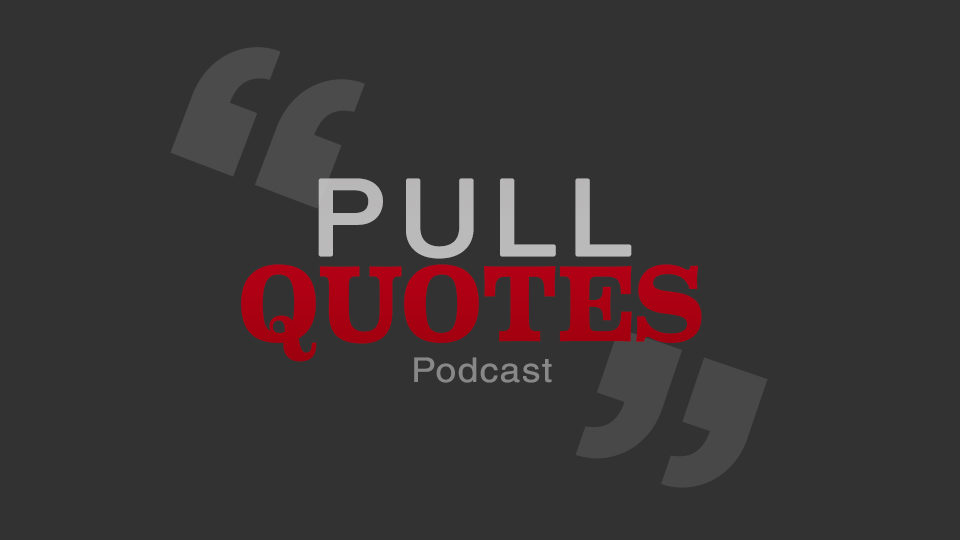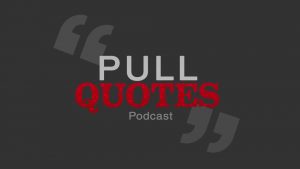Pull Quotes -Ep. 9: Journalism after #MeToo
Archived series ("HTTP Redirect" status)
Replaced by: Pull Quotes: [ ] Review of Journalism
When?
This feed was archived on September 06, 2018 12:26 (
Why? HTTP Redirect status. The feed permanently redirected to another series.
What now? If you were subscribed to this series when it was replaced, you will now be subscribed to the replacement series. This series will no longer be checked for updates. If you believe this to be in error, please check if the publisher's feed link below is valid and contact support to request the feed be restored or if you have any other concerns about this.
Manage episode 193251842 series 1008096

Stories of sexual misconduct dominated the news cycle this autumn–and it all started with investigative reporting. But where should journalists push next? Anne Kingston (Maclean’s) and Hannah Sung (Globe and Mail) discuss journalism after #MeToo, Canada/U.S. differences, Ghomeshi comparisons, and whether this is really the cultural shift Time Magazine says it is.
Podcast guests:
- Anne Kingston is a senior writer at Maclean’s. She covered the Jian Ghomeshi trial extensively in 2016, and is the author of The Meaning of Wife: A Provocative Look at Women and Marriage in the 21st Century and The Edible Man: Dave Nichol, President’s Choice and the Making of Popular Taste.
- Hannah Sung is a video producer at the Globe and Mail. She co-hosted the Globe’s Colour Code podcast, and recently produced the #AfterMeToo symposium in Toronto.
Anne Kingston and Hannah Sung.
Time Magazine’s editor in chief called it “one of the highest-velocity shifts in our culture since the 1960s.”
But when it comes to sexual misconduct, Anne Kingston thinks it’s a bit premature to talk about a societal shift.
We’re seeing men topple from their jobs, she said, but there are still larger systemic issues.
“At this moment we’re sort of buoyed with optimism, but at the same time we have to be even more hypercritical not to get sucked up into it,” said Kingston.
Journalists need to “connect the dots, explain systemic issues, and call governments to account. Whistleblower protection legislation, for instance, would be “vital” for people coming forward with sexual misconduct allegations, Kingston said.
Hannah Sung says journalists also need to humanize people who we’re not “trained” to listen to, she said — people who aren’t beautiful, white and wealthy.
There’s a lot of cultural applause for people who come forward with allegations, she said, but they are often individuals who don’t have as much to lose.
As heard on the show…
-Time magazine names “The Silence Breakers” their Person of the Year
-Highlights from the Globe and Mail’s #AfterMeToo symposium
-Robyn Doolittle’s “Unfounded” investigation (Globe and Mail)
-Canadaland’s Jesse Brown critiquest Canadian media post-Weinstein (minute 32)
-Kingston mentioned a Mother Jones investigation on the show, but later clarified she was thinking of this piece by The Nation about women in the service sector resisting sexual harassment.
-Columbia Journalism Review looks at sexual harassment policies in newsrooms
Other reading:
-When Black Women’s Stories of Sexual Abuse Are Excluded from the National Narrative
-Me too: It’s not just Hollywood, it’s Canada (Leah McLaren, Maclean’s)
From Anne Kingston:
– Why the A-list masturbating creep is the defining image of 2017
-Workplace harassment: the systemic rot that can’t be measured
Me Too in the Newsroom
As stories rolled in about sexual misconduct by prominent American journalists, the Columbia Journalism Review took a hard look at newsroom sexual harassment policies.
“We very obviously have a problem with newsroom culture,” said CJR senior staff writer Alex Neason. “Answering the question, how we change newsroom culture, we thought at least begin with having a really transparent and critical look at the policies that govern those cultures.”
So CJR embarked on a wide-scale survey project of organizations across the United States. While none of the 149 newsrooms contacted responded to their survey, Neason said they got an “overwhelming response,” from more than 300 individual journalists.
CJR: What We Found When We Asked Newsrooms About Sexual Harassment
Dozens wrote about their experience of sexual harassment in the newsroom, which Neason said CJR will be reporting on in the coming weeks.
NBC was among the 149 newsrooms @CJR asked to participate in a survey on newsroom sexual harassment policies. The didn't respond. Nobody else did either:
CJR found 66 per cent of participating staff journalists said their companies had clear sexual harassment policies. But just 21 percent said they strongly understood those policies. Furthermore, 96 per cent of freelancers said newsrooms they work with had never shared copies of their sexual harassment policies with them.
“Going through the results…it was a little overwhelming to realize again just how pervasive a problem we have,” said Neason, who says she was more distressed than surprised.
“If our values around transparency and around a rigorous quest for the truth are to be taken seriously then they have to be equally applied to our own industry. And that can be really hard to do. It can be uncomfortable.”
While many of the journalists facing allegations are in the U.S. media (Charlie Rose, Glenn Thrush, Matt Lauer, John Hockenberry), Canadian media is not immune. Last year in the Ryerson Review, Catherine Phillips’ feature “Why is this still happening?” looked at how harassment and sexism still exist for women in Canadian journalism.
Anne Kingston says harassment and misconduct is a problem in every industry–and that perhaps we’re in for our own cultural reckoning.
I'm okay with colder. I was sitting w/ Wente and @globeandmail editor discussing crash of Concorde jet in Paris when he rubbed my leg under the table. I was too shocked to say anything.
Thoughts from Lucy DeCoutere
On this episode, Kingston and Sung discussed the Jian Ghomeshi trial and the problems it highlighted with how the courts handle sexual assault.
Lucy DeCoutere was one of three women who testified against Ghomeshi (the former CBC host was acquitted of four counts of sexual assault and one of overcoming resistance by choking). She said that looking back, she has regrets about going through the legal system. The experience radically altered her life, DeCoutere said, and she’s she’s still feeling the impact. But DeCoutere said she did it for the other women who suffered more than she did,
Women who are thinking about coming forward with allegations, she said, should “know what you’re giving up and know what you’re gaining.”
Lucy DeCoutere talks about the impact of testifying in court, why she went to the press, and what she wants other women to know.
16 episodes





